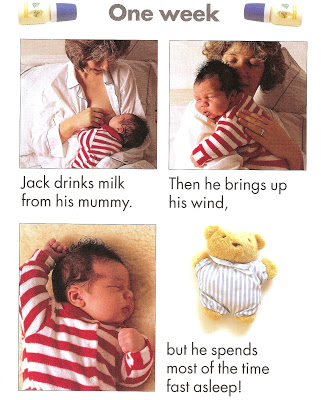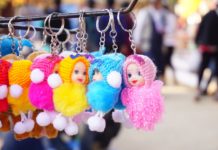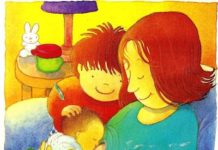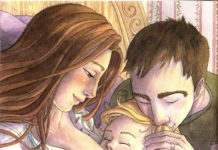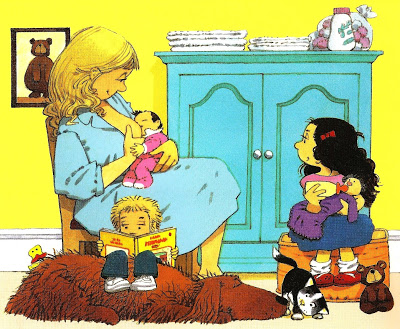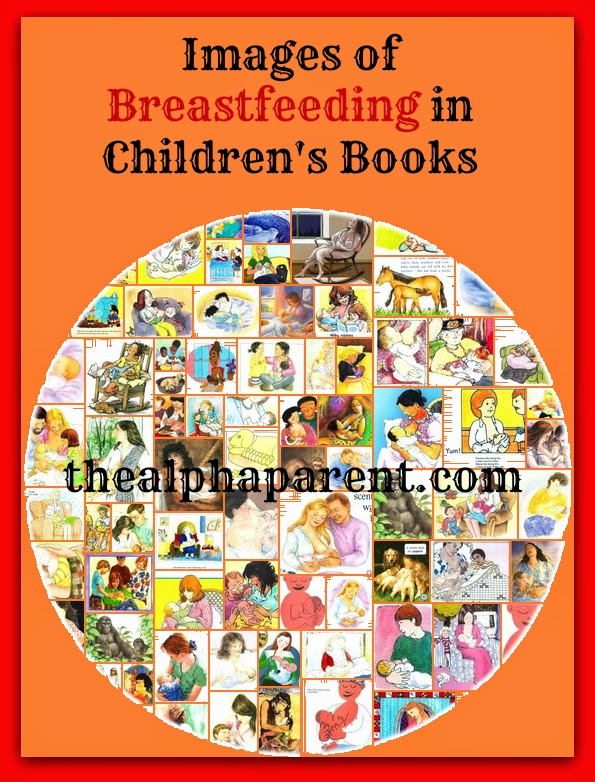
Have you ever counted the number of bottle-fed babies portrayed in your child’s books? Yet children’s books depicting lactation are more elusive than your pelvic floor after a vaginal delivery. If 95 percent of the books available to children contain only bottle-feeding images, this perpetuates the myth that bottle-feeding is the normal way to feed babies.
Thus I’ve set myself the challenge of scouring the bookshops and libraries of the country in search of breastfeeding in children’s books. I will be presenting my findings in a series of ‘parts’. Welcome to part one.
Sophie And The New Baby
Catherine Anholt and Laurence Anholt
From the “new baby” genre, this book explores the emotional ups and downs experienced by a young girl when her baby brother arrives. It’s the usual business of jealousy, fear and ultimate acceptance. Breastfeeding is shown, as it is commonly in this genre, as an inconvenience to the older sibling, an act which keeps her mother in a state of occupation. “He wanted to be fed… he wanted it right now” the text explains. On the other hand, the mother is shown happily nursing in the two illustrations that feature breastfeeding. Her hair is spruced, she is wearing earrings, a necklace and feminine clothing. This groomed appearance is a breath of fresh air compared to the haggard, exhausted depiction of breastfeeding mothers commonly seen in media.
What Do Cows Do?
Ticktock Media Ltd
I was hesitant to feature this book here as it doesn’t contain breastfeeding per se. Rather it features animals nursing. However for a book that only has 10 pages, to feature nursing so centrally is worthy of mention. Needless to say the content is very simplistic. The book begins by describing that cows live on farms, they eat grass, they go moo, you get the picture. Then the text explains that cows make milk inside their bodies and the milk comes out of “here” with an arrow pointing to an illustration of udders. The next double page spread shows cows nursing their babies with the accompanying text “The calf drinks milk from its mum”. This simple board book could be seen as a celebration of what connects us as mammals.
A Baby Just Like Me
Susan Winter
Martha, a little girl, is excited at the imminent arrival of her baby sibling, however when the baby is born, she learns the terrible truth – newborns don’t do anything. They’re boring. “And worse, it seems to take up all of mum’s time and attention”. The baby takes no notice of the puppet show that Martha and her friend Sam perform, it sleeps right through the song they sing, also it cries and scares away their pet bird. At one point Sam suggests “you should send the baby back”. Eventually Martha goes crying to her mum, who is breastfeeding. Martha sobs, “You’re always with her”. Then we see the cosy Hallmark moment where her mum scoops Martha into her arms and explains that the baby will grow into “a proper sister”. Predictably the baby does just that, and all is well again.
Just Like You Did
Marjorie Newman and Ken Wilson-Max
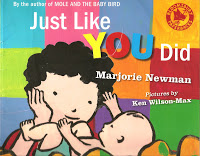
More of the same. This is the typical formula of the new baby genre: newborn arrives, existing sibling feels rejected, relatives fuss over the new baby, Mum and Dad are forever occupied with the new baby, existing child has a stroppy tantrum, cue reassuring hugs from parents. Breastfeeding is yet again shown as one of the chores that keep the parents occupied. On a positive note, books such as this one, which depict breastfeeding as burdensome, often show Dad getting on with chores whilst Mum relaxes to feed the baby. A good book to purchase for new Dads then.
Brand New Baby
Bob Graham
Bob Graham is a legend and you’ll see his work sprinkled throughout my investigation into children’s books. However the cover of this book features a bottle and there are bottles scattered on the inside covers so I wasn’t holding out much hope when I picked it up at the library. The story begins with a lot of emphasis on pregnancy, including a particularly humorous illustration of Mum being hoisted off the sofa by her children Edward and Wendy.
The family prepare for the new baby and “Dad helped too” by ironing the baby’s tiny clothes (I have issues with media that depicts Dads doing normal childcare activities as “helping” but that’s for another blog entry). When the new baby is born the other children turn up at the hospital dressed as Batman and Wonderwoman – a nice touch. A mother in the neighbouring bed can be seen bottlefeeding her newborn.
When the new baby arrives home it’s the same old story: he’s boring, he sleeps a lot, Mum and Dad never have time for Edward and Wendy, “mum was always busy feeding the baby”. One illustration shows Mum on the sofa breastfeeding the baby, another illustration shows the baby crying in its moses basket with a bottle on the floor nearby (combination feeding? Expressed breastmilk? Or lazy illustrating?) The story concludes with a sudden change of heart from Edward and Wendy and they start helping out with babycare, although it is not mentioned what prompts this transformation.
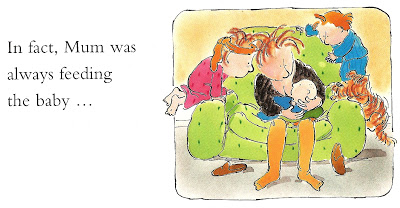
Aren’t You Lucky
Catherine and Lawrence Anholt
Here we go again, another story of sibling rivalry where breastfeeding is featured in the saddest scene of the book (there are some positive depictions of breastfeeding in some children’s books, and I will get to them, honest). Written and illustrated by the same duo that created “Sophie and the New Baby” this book features another little girl whom is about to pass into big sisterhood. The text is composed in first person narrative, from the perspective of the girl (who isn’t given a name). In one scene, “Do you think he looks like me or like Daddy?” asked Mummy. “I think he looks like a raspberry” the girl responds matter of factly. In the next scene the baby is described further, “He can’t talk yet, but he can cry alright, especially when he’s hungry” and Mum is seen breastfeeding happily in bed. Lots of people come to visit the new baby, and they all say to the older sibling “Aren’t you lucky!” The girl then explains: “But sometimes I didn’t feel lucky at all” and she is shown sitting on a chair looking miserable, whilst her Mum breastfeeds on the sofa. It’s the most damning illustration of breastfeeding I have seen in a children’s book. Not until the baby is significantly older and weaning does the little girl become accepting of him. “If only I had someone who could help me. I wish I had a big girl who could feed my baby” sighs Mum. The little girl responds, “I could do that”, and she is seen spoon feeding the baby pureed banana.
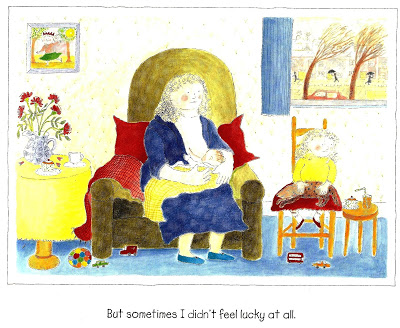
The Baby’s Catalogue
Janet Ahlberg and Allan Ahlberg
All You Need to Know About Babies
Agn S Vandewiele and Charles Dutertre
With a bottle to breast ratio of 4 to 1, I was disappointed with this book, although perhaps the bottle on the cover should have given the game away. The book follows the usual pregnancy timeline. First Mum and Dad are shown in bed with no explanation, then a little bean is depicted growing inside naked Mum’s tum (surprisingly as the baby grows bigger – Mum’s breasts don’t), then the ultrasound scan (complete with foetus waving back), the obligatory eating of copious amounts of cake by the mother, Grandma knitting outfits and Dad putting together the nursery. Finally comes the (as per usual) hospital delivery, with Dad, camcorder at hand, filming as Mum lies naked in stirrups (I’d have walloped him). Mum is shown breastfeeding once, and then all other feeds are done via bottle. This is sadly realistic of course. The page that induced the most eye rolls features Dad feeding the baby via bottle whilst Mum sits beside him, cleavage heaving with pride; and yet despite the immediate presence of Mum, baby is sucking a silicone teat.
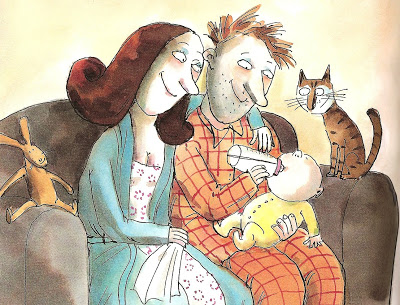
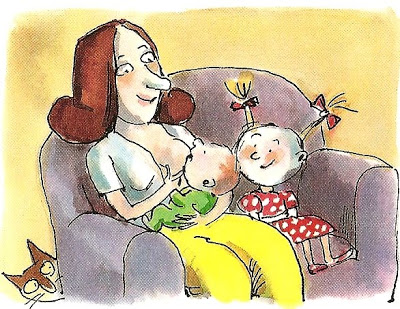
The Story of Christmas
Jane Ray
With text adapted from the words of the Bible, this book has everything you would expect from a nativity story: angels, wise men, oxen, Jesus, a stable and all that jazz. Mary is seen breastfeeding the newborn baby Jesus in not one, not two, but three illustrations; one of which shows her nipple as Jesus latches on. The illustrations are gorgeous and my simple scannings of them cannot do their vibrancy justice. Various gold enamels are used which produce a distinctive glow and the drawings are detailed enough to spark numerous re-readings. Breastfeeding is not mentioned in the text.
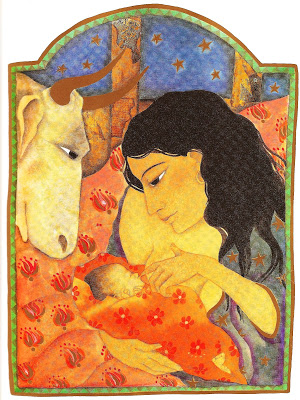
Baby’s First Year
Debbie Mackinnon and Anthea Sieveking
Baby’s First Year is another non-fiction title similar to The Baby’s Catalogue but using photographs rather than illustrations. This book follows the life of baby Jack from one day old to his first birthday. Dad and siblings are shown happily taking part in babycare. On the page titled “One week” the book describes that “Jack drinks milk from his mummy” accompanied by a photograph of breastfeeding. Curiously there are bottles at the top of this page, presumably to show the alternative. I find it interesting that weaning onto solids is not shown until 8 months. Overall the book is a decent exploration of babyhood, with some baby-wearing thrown in for good measure.
